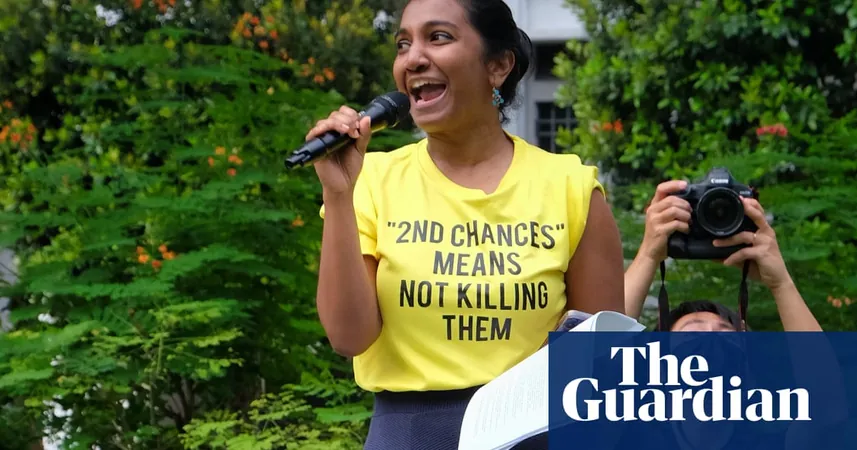
Courageous Activist Kokila Annamalai Defies Singapore's Draconian Online Speech Laws
2024-11-06
Author: Ming
Kokila Annamalai's Advocacy and Recent Controversy
Kokila Annamalai, a leading voice in Singapore’s activism scene, has dedicated years to advocating for death row inmates and their families who face the harrowing prospect of execution. Recently, she found herself at the center of controversy when the government ordered her to issue a "correction" on social media, countering her criticisms of Singapore's stringent laws regarding death row inmates, whom officials accused of "abusing" the justice system.
Annamalai's Stance on Rights of Death Row Inmates
In her own words, Annamalai passionately asserts, "Death row prisoners are among the most voiceless and powerless individuals in our society. The courts wield enormous power over their lives." This situation escalated when the government issued a notice implying that certain inmates exploit judicial processes to delay their executions. Annamalai felt a profound sense of injustice, adding, "It is their right to fight for their life; to label it as abuse is deeply troubling."
Defiance Against Pofma
At just 36 years old, Annamalai has chosen to contest this government mandate, making her the first individual known to defy Singapore's recently enacted Protection from Online Falsehoods and Manipulation Act (Pofma). This defiance could lead to severe penalties, including a jail term.
Determined to Stand Up Against Intimidation
Annamalai is determined to take a stand against what she perceives as unnecessary intimidation. "I want to hold the line and demonstrate that we don't have to be silenced by the system," she declared.
Continued Challenges and Obstacles
Over the years, Annamalai has been subjected to multiple police investigations and a criminal charge stemming from her involvement in peaceful protests. Her organization, the Transformative Justice Collective (TJC), has faced obstruction from the authorities, specifically in their attempts to hold public exhibitions regarding death penalty issues. With such topics largely taboo in Singaporean media, social media represents one of the few remaining platforms for critical dialogue.
Government's Fear of Online Dissent
The activist believes that the government’s growing legislative constraints signal their fear of online dissent. "They are terrified of the critical discussions unfolding in the digital realm. Previous laws didn't address the extensive outpouring of discontent, leading to the introduction of Pofma," she argues.
Potential Consequences of Defiance
Currently under investigation by the Pofma office, Annamalai could face a hefty fine of up to $20,000 and potentially a year in prison for her refusal to comply with the correction notice. Human rights advocate Kate Schuetze of Amnesty International labels such maneuvers as desperate attempts to quash peaceful expressions of dissent and criticism.
Evolution of Civil Liberties in Singapore
Annamalai’s activism journey commenced during her university days. She has noted a noticeable transformation in public sentiment towards civil liberties. "In the past, protest actions were frequently met with contempt and hostility," she remarks, reflecting on the cultural shift. "Now people are beginning to recognize the importance of these issues."
The Failing Bargain of Order and Liberty
She contends that the unspoken arrangement between the government and citizens—that sacrifices in civil liberties are compensated by public order and a stable society—is faltering. With rising inequality and mounting living costs, Annamalai poignantly points out, "People are struggling, and their trust in this bargain is being tested."
Impact of Annamalai's Activism
This evolution in social consciousness underlines the significance of her defiance against the Pofma Act. Her Facebook post, which received government scrutiny, referenced the execution of Azwan bin Bohari, sentenced after being convicted of trafficking drugs. The official response to her allegations that due legal process is undermined paints her assertions as unfounded.
Focus on Human Stories
Annamalai maintains that her statements centered on the trauma and confusion bureaucratic decisions inflict on families of those condemned. The government’s assertion that her views undermine trust in public institutions has sparked further debate on the ethics of Singapore's judicial approach.
Growing Dissent Against Death Penalty
Despite acknowledging the challenging landscape, Annamalai remains undeterred. It is noteworthy that while polls from 2018 indicated widespread support for the death penalty, an increasing number of citizens are now calling for its abolition. In 2022, a rare demonstration against capital punishment attracted over 400 participants, signaling a growing dissent against the long-standing narrative that has dehumanized death row inmates.
Challenging Societal Perceptions
By sharing the personal stories of those on death row, Annamalai and her supporters aim to illuminate the often-overlooked identities of these individuals, many of whom come from marginalized backgrounds. "Challenging societal perceptions of these prisoners complicates the narrative surrounding the death penalty," she concludes.
A Pivotal Moment in Civil Rights Discourse
Kokila Annamalai’s brave stand against oppressive legislation underscores a pivotal moment in Singapore's civil rights discourse. It raises the question: can courage ignite a new culture of dissent in a society long accustomed to silence?

 Brasil (PT)
Brasil (PT)
 Canada (EN)
Canada (EN)
 Chile (ES)
Chile (ES)
 España (ES)
España (ES)
 France (FR)
France (FR)
 Hong Kong (EN)
Hong Kong (EN)
 Italia (IT)
Italia (IT)
 日本 (JA)
日本 (JA)
 Magyarország (HU)
Magyarország (HU)
 Norge (NO)
Norge (NO)
 Polska (PL)
Polska (PL)
 Schweiz (DE)
Schweiz (DE)
 Singapore (EN)
Singapore (EN)
 Sverige (SV)
Sverige (SV)
 Suomi (FI)
Suomi (FI)
 Türkiye (TR)
Türkiye (TR)